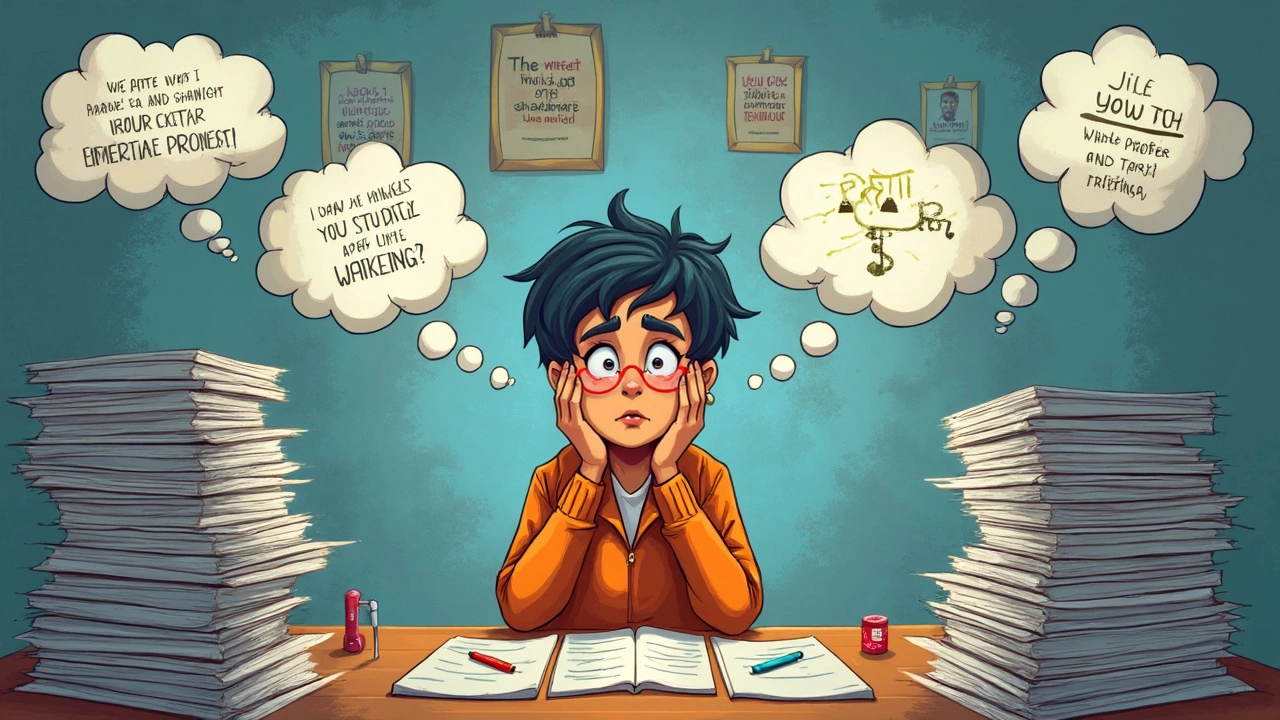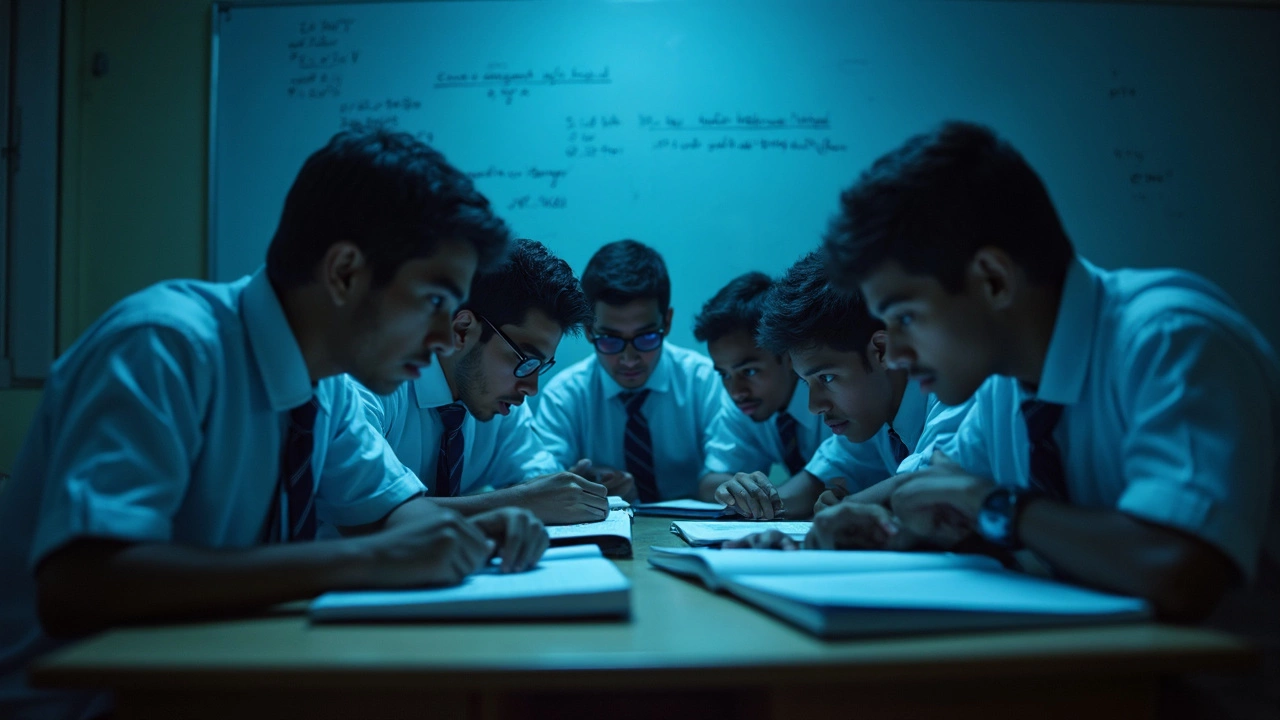When people ask 'Which was the toughest JEE Advanced paper?' it isn’t just casual talk. For thousands, that exam is personal—one brutal morning can flip years of effort upside down.
Out of all the JEE Advanced tests, the 2016 and 2018 papers are legendary for breaking spirits. Social media was full of jokes and memes those years, but behind the laughter was a bunch of students sweating bullets over Physics and tricky Math questions that left even coaching teachers scratching their heads.
If you’re prepping now, it probably feels like anything could happen. Truth is, even teachers can’t always predict when an exam will take a wild turn. Tough papers pop up without warning, and they're not about how much you memorize—they’re about how well you think on your feet. If you want to survive—or even thrive—then learning from the hardest JEE Advanced years is smart. The best prep isn’t just bookwork; it’s mental agility, strategy, and knowing what could blindside you.
- Remembering the Most Difficult Years
- Why Some Papers Felt Brutal
- What Top Performers Say About Toughness
- Doctoring Your Strategy for Hard Papers
- Common Traps That Stump Everyone
- Lessons You Can Steal from Past Survivors
Remembering the Most Difficult Years
If you’ve heard senior IIT aspirants or current engineers grumble about the toughest JEE Advanced paper, 2016 and 2018 always come up first. The internet blew up those years with memes about students nearly crying in the exam hall, but honestly, the panic was real.
2016’s Paper 2 was a shocker for most. Math set the bar crazy high—so much so that many students came out saying they barely managed to attempt even half the questions. Physics included those lengthy, calculation-heavy problems that looked innocent but ate up tons of time. Chemistry didn’t show any mercy either; the physical section had concepts that wouldn’t show up in most standard books.
The 2018 JEE Advanced paper had its own brand of cruelty. For the first time, the whole thing went completely online. Many students found the interface confusing, and this just added to the pressure. Math that year had some questions with options like ‘none of these,’ making it hard to guess and increasing silly mistakes. Physics was super conceptual, and the Chemistry section teased students with options so close you'd doubt your memory.
Here’s a quick peek comparing some tough years and what stood out:
| Year | What Made It Tough? |
|---|---|
| 2016 | Unusually tough Math, lengthy Physics, tricky Physical Chemistry |
| 2018 | First online exam, confusing UI, option traps, conceptual Physics |
| 2015 | Unexpected pattern, lots of confusing multi-correct questions |
If you’ve ever wondered whether past papers were as painful as people say, trust me—they really were. When people mention the infamous 2016 or 2018, they're not exaggerating. This isn’t just trivia: it’s a warning to never walk into the JEE Advanced thinking it’ll be a routine test.
Why Some Papers Felt Brutal
There’s a reason certain JEE Advanced years still haunt students. Not all papers are made with the same mindset. In some years, the question setters turned up the heat, making problems longer, more confusing, or plain weird. Let’s talk specifics.
Take 2016 for example. The Physics section that year was a beast. Many questions involved complicated calculations, multi-step reasoning, and topics that didn’t usually hit that hard. Lots of aspirants even ran out of time and had to guess way more than they’d like. Then came 2018, especially Paper 2. The Math section caught even the top rankers off-guard with its length and high level of logical thinking. Chemistry wasn’t far behind, throwing in plenty of new-style questions.
So, what exactly makes a JEE Advanced paper feel ‘brutal’? Here’s what past papers did to students:
- Tough Questions: Instead of the usual standard problems, you get stuff that forces you to combine topics, or twist concepts in a new way.
- Lengthy Calculations: Questions that take ages to solve eat up your time, so even knowing the method doesn’t help you finish everything.
- Unexpected Formats: Some years experiment with rare question types, like matrix matching or integer-type, which most people don’t see as much in practice papers.
- Trap Options: MCQs can have distractors that look very tempting, and one small mistake means negative marks, killing your overall score.
- Section Fluency: A tough paper isn’t just about difficulty, but also jumping from an easy section to suddenly hitting a brick wall in the next, which destroys your confidence mid-exam.
Check this quick comparison from actual candidates on how the major tough years ranked in terms of difficulty:
| Year | Paper | Toughest Section | Common Complaint |
|---|---|---|---|
| 2016 | Paper 1 | Physics | Heavy calculation, time crunch |
| 2018 | Paper 2 | Math | Lengthy, brain-twisters, too many steps |
| 2015 | Both | Chemistry | Unexpected new concepts, tricky formats |
Bottom line: It’s not just about ‘hardness’. When a JEE Advanced exam swaps fast questions for time drains, brings in new formats, or starts mixing concepts out of nowhere, it truly feels brutal. Being ready for these curveballs is part of cracking this exam.
What Top Performers Say About Toughness
Ask anyone who topped JEE Advanced in a tough year and you'll hear things you never read in prep books. Take Chirag Falor, AIR 1 in 2020. He called the exam an 'actual test of concepts, not memory' and said solving was less about repeating formulas, more about applying basic ideas in new ways. For 2016, Aman Bansal (AIR 1) shared that the tricky part wasn’t just hard questions—it was weird wording and twists that forced him to rethink even simple topics.
Many toppers agree: what makes a paper tough isn’t always raw difficulty. It’s the mix—some questions so easy you second-guess yourself, others so unfamiliar you literally stare blankly. Students from the 2018 batch pointed out that Physics Paper 1 had barely any straightforward problems, and the Math section had multiple correct options, which spiked the mental load.
There’s a running joke in coaching circles: "If it feels too easy, check again." Past toppers say the examiners love to mess with overconfidence. The trick is, don't panic when you don't know one question—move on, secure the marks you can, then circle back.
You’ll also hear a lot about time management. In a poll of 2022 rankers, most said they left at least 2-3 questions unsolved on purpose, because every extra minute could have cost them points elsewhere. It's all about maximizing your score, not getting everything right.
| Year | Topper | Main Challenge |
|---|---|---|
| 2016 | Aman Bansal | Misdirection, complex logic |
| 2018 | Pranav Goyal | Unfamiliar question types, tough Physics |
| 2020 | Chirag Falor | Application over rote learning |
Even the best minds doubted themselves during tough papers. What separated them was quick recovery—they didn't get stuck. Almost all top performers stress: practice mock tests that genuinely scare you, and you'll be more chill when the real deal hits.
- Don't chase 100% accuracy, aim for smart scoring.
- If unsure, move forward and come back later.
- Papers are unpredictable, but your reaction to surprises isn’t.
Toughness is less about the paper and more about how you play the exam. Listen to those who’ve aced it—they don’t just work harder; they work smarter.

Doctoring Your Strategy for Hard Papers
If you walk into the JEE Advanced hall and get a paper that looks like it was made to ruin your weekend, don’t panic. Top rankers—and even coaching giants—admit one thing: your game plan matters more than sheer brainpower when the going gets tough.
So, how do you handle a nightmare exam? Focus on what’s in your control. Here’s what experienced toppers have done when hit with a famously tough JEE Advanced paper:
- Scan, Don’t Dive: Spend the first 5 minutes browsing the whole question paper. Pick out the easier questions—every paper, even the tough ones, has some. Go for quick wins first, then circle back for the monsters.
- Don’t Get Stuck: Can’t crack a question? Don’t sit and wrestle forever. Set a personal time limit per question—if it takes too long, move ahead. One tricky Physics question can’t be allowed to eat 20 minutes.
- Stay Flexible: In the hard papers from 2016 and 2018, many top scorers tweaked their subject sequence on the fly. Some noticed Physics was brutal but Chemistry was manageable, so they switched sections to avoid getting mentally blocked.
- Keep Cool About Low Attempts: There’s no bonus for bravado. In really tough papers, cutoffs drop. In 2016, the average marks for a good rank fell way below the usual. Worry less about completing everything; focus instead on maximizing accuracy and picking battles wisely.
- Make Educated Guesses When Needed: For multiple-correct questions, cancelling out obvious wrong choices can tip the scale. Don’t guess wildly, but sometimes eliminating just two options gets you close enough for a calculated shot.
Check out how cutoffs can shift during tough years:
| Year | Paper Toughness | General Category Cutoff (Total Marks) |
|---|---|---|
| 2016 | Very High | 75/372 |
| 2018 | High | 90/360 |
| 2022 | Moderate | 89/360 |
It’s proof: nobody has to ace every question. The toughest JEE Advanced papers test thinking under pressure, not perfection. Practice mocks in tough conditions, time yourself, and always walk in with a plan B. As one All India Rank 12 put it, “The moment I realized nobody else would find it easy, I stopped panicking.”
Common Traps That Stump Everyone
Even the sharpest students have fallen for the sneaky tricks in the JEE Advanced paper. Knowing these traps can save you a lot of heartburn during the real thing. The examiners don’t just want you to know your formulae—they want to check if you really get the concepts or just memorized steps.
One trap that shows up often is the 'too easy to be true' question, especially in subjects like Math. When you see a classic integration or a triangle problem and the first step leads neatly to an answer, double-check! In tough years like 2016, these questions hid subtle catch points—maybe a sign error or a hidden assumption. Missing it meant losing marks that could have taken you out of the top 500 or even top 2000.
Multi-correct questions are another killer, especially because they punish wild guesses. You get full marks only if you pick every correct choice and avoid every wrong one. A half-hearted attempt often means no points at all.
- Read every option—sometimes two choices look close, but one has a tiny difference, like an extra negative sign or a flipped sequence.
- Zero marks for partial answers: If you’re not sure, it’s often smarter to leave these blank than to gamble.
Physics problems in the JEE Advanced are famous for mixing concepts. One 2018 paper had a question that combined rotational motion, friction, and energy conservation all at once. Some students spent 20 minutes on it, only to realize they’d used the wrong moment of inertia formula because they rushed.
Let’s talk stats—the Math section in 2016 saw an average score of just 21 out of 120 for most students. That’s not just tough, that’s brutal. Get stuck on one question, and suddenly, half an hour disappears. Time management is a trap all on its own.
- Don't get emotionally attached to any one question. Mark it for review, move forward, and come back if you have time.
- Beware of converted units—even a cm vs. m slip-up can ruin an otherwise perfect solution.
- Check for 'none of the above' options. They’re bait to see if you’ve solved the whole thing correctly or just made a wild guess.
If you ever wondered why IIT JEE is hard, it's because the paper loves to trip you up like this. The best way to deal with these traps? Practice actual past 'tough' papers under timed settings. Every mistake you make now is one less in the real exam.
Lessons You Can Steal from Past Survivors
Let’s face it—no matter how much you practice, the JEE Advanced finds ways to shake everyone. Students who beat the hardest years didn’t have secret knowledge or better books than everyone else. They just adapted better when things went sideways.
After 2016 and 2018, most toppers agreed that the real fight was mental. Every time a section looked impossible, they refused to panic or get stuck. Rishabh, an IIT-Delhi student from the 2018 batch, shared how he skipped the two toughest Chemistry questions and focused on what he could solve first, scoring way more than friends who wasted time obsessing over a single killer question.
Here’s what these survivors did differently to beat the toughest paper moments:
- Don’t Let Tough Questions Hijack You: Most toppers say if you get stuck for more than two minutes, flag it and move on. You can always come back if there’s time.
- Read Instructions Like a Hawk: Odd marking schemes threw people off in 2016. A lot of students dropped marks simply because they misread the fine print. Always double-check the rules at the start of each section.
- Start with Your Strengths: Past survivors often began papers with subjects or types of problems they loved, building confidence right away. Confidence can actually boost your speed and accuracy.
- Practice Real Test Conditions: Toppers mentioned they regularly wrote mock tests in exactly three hours with timers and zero distractions. You catch your exam-time habits and weak spots this way, no surprises on D-day.
- Stay Flexible: Don’t walk in with a fixed order—if the Physics section feels impossible right now, jump to Math or Chemistry. Adapt on the fly; it works.
Here’s a quick comparison to show you what toppers vs. average scorers did during those nightmare years:
| Strategy | Topper Habit | Average Scorer Habit |
|---|---|---|
| Time Management | Switched questions quickly | Stuck on hard questions too long |
| Handling Surprises | Stayed calm, changed approach | Panicked, lost focus |
| Mock Practice | Full timed mocks, mixed level | Mainly solved old, easy papers |
| Instructions | Checked for new formats/marks | Glossed over section details |
No magic tricks, just smarter moves and steady nerves. If the IIT JEE throws a curveball, remind yourself that every top scorer went through it too. What separated them was mindset, not memory.

